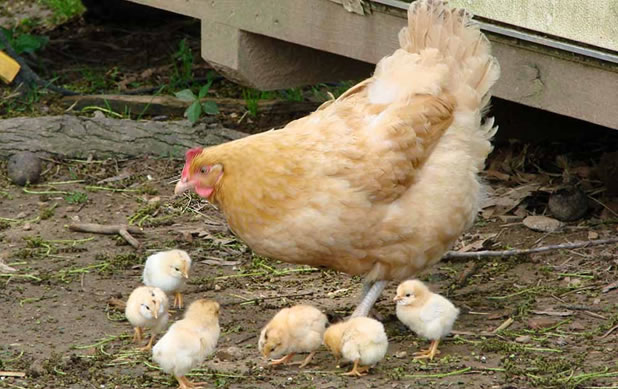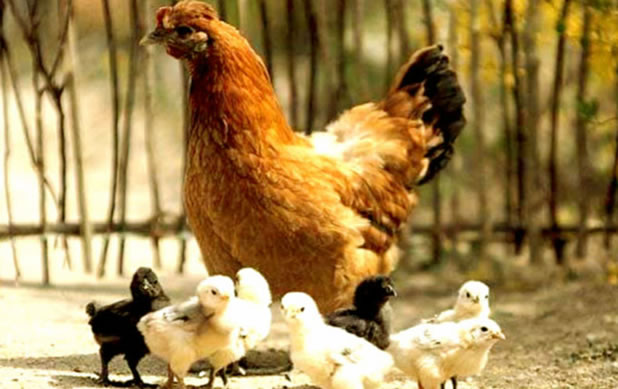October, 2003 Proverb: “The hen with baby chicks doesn’t swallow the worm.” – Sukuma (Tanzania)
Kuku mwenye vifaranga hamezi funza (nyungunyungu). (Swahili)
The hen with baby chicks doesn’t swallow the worm. (English)

Sukuma ( Tanzania) Proverb
Background, Explanation, Meaning and Everyday Use
An inspiring Sukuma proverb in Tanzania on sacrifice and self-denial is The hen with baby chicks doesn’t swallow the worm. Its main theme is “Parental Care.” The mother hen is constantly looking for food to feed her chicks. When she does find some food, for example a worm, she doesn’t eat it but leaves it for her chicks. Only after the chicks have eaten and been satisfied will the mother hen take something for herself. In contrast to the hen, the mother duck doesn’t provide for her ducklings. She let’s them fend for themselves. See the Sukuma proverb Uli ng’wana wa mbata ibegejage (You are the child of a duck; take care of yourself).
Similar African proverbs are When a woman is hungry she says: “Roast something for the children that they may eat” (Akan, Ghana). No matter how skinny, the son always belongs to his father (Galla, Ethiopia). The cows never run away from her calves (Bemba, Zambia). The porcupine lovingly licks her spinney (thorny) offspring (Oromo, Ethiopia). The child who stays near his or her mother does not fall into the trap (Chewa, Malawi/Zambia). The mother hen does not break its own eggs (Swahili, Eastern Africa). The umbilical cord and strap in which the cord is wrapped is like mother and child (Ganda, Uganda).
Parents can learn much from this proverb. It is their obligation to care for their children by providing what is necessary for their health, education and right conduct — food, clothing and other needs. To fulfill their obligations to their children, it is necessary for parents to be self-sacrificing and forego certain things in their lifestyle, for example, excessive beer drinking, wearing expensive clothes, etc.
An important aspect of African proverbs is their participatory nature that fits in very well with relationship and community values. Sometimes a preacher or teacher gives the first half of the proverb and the congregation or audience responds with the second half: Unity is strength…division is weakness. The hen with baby chicks…doesn’t swallow the worm. The second half is the advice that the speaker wants the audience to accept so he or she “maneuvers” the listeners so that the words come from their own lips.
Biblical Parallels
There are many rich biblical parallels:
- “For the Son of Man came not to be served but to serve, and to give his life a ransom for many.” (Mark 10:45)
- “If you then who are evil know how to give good gifts to your children, how much more will the heavenly Father give the Holy Spirit to those who ask him!” (Luke 11:13)
- A mother’s self-sacrificing love: “Can a woman forget her nursing child, or show no compassion for the child of her womb? Even these may forget, yet I will not forget you. See, I have inscribed you on the palms of my hands; your walls are continually before me. (Isaiah 49:15-16)
- The eucharistic implications of the proverb: “I am the living bread that came down from heaven. Whoever eats of this bread will live forever; and the bread that I will give for the life of the world is my flesh.” (John 6:51)
Contemporary Use and Religious Application
 This Sukuma proverb can be applied to those involved in politics. To take a leadership role in the government demands a spirit of self sacrifice. Like the mother hen the leader should do everything possible for the well being of the people. The leader should forget personal needs to serve the needs of others.
This Sukuma proverb can be applied to those involved in politics. To take a leadership role in the government demands a spirit of self sacrifice. Like the mother hen the leader should do everything possible for the well being of the people. The leader should forget personal needs to serve the needs of others.
The proverb applies to God’s provident care for his sons and daughters in Christ. God is a loving and caring Father and Mother who will never abandon those who give themselves entirely to God. God did not hold back his own Son Jesus Christ but offered him for us all. He who gave his own son will he not freely give us all things.
NOTE: See Sukuma Proverb No. 13 in Donald Sybertz, M.M. and Joseph Healey, M.M. Kueneza Injili kwa Methali: Kitabu cha Kwanza –Hekima ya Kisukuma na ya Lugha Mbali Mbali juu ya Chakula. Peramiho, Tanzania: Benedictine Publications Ndanda-Peramiho, 1984. 78 pp. The English translation is Preaching the Gospel Through Proverbs. Written by the Sukuma Research Committee of the Sukuma Cultural Center, Bujora, Mwanza, Tanzania. 35 proverbs and three riddles — a total of 38 Sukuma, Tanzania examples of oral literature on 34 themes on “Food, Eating and Meals” including: original Sukuma proverb; Swahili translation; similar Swahili proverbs; history, explanation and use of the proverb; biblical parallels; religious teaching; suggestions for use in religious education; and similar well-known English proverbs on the same theme. With 23 accompanying drawings. This is the first book in a series of Swahili books on the inculturation of the Gospel and proclaiming the Gospel through Sukuma proverbs, sayings, riddles, stories and songs. Many Tanzanian and a few Kenyan languages are used.
Rev. Boniface Mabula
Mwanza Archdiocese
P.O. Box 1421
Mwanza, Tanzania
Email: bmabula@hotmail.com
Rev. Donald Sybertz, M.M.
Ndoleleji Parish
P.O. Box 47
Shinyanga Tanzania
Email: chancshy@africaonline.co.tz
